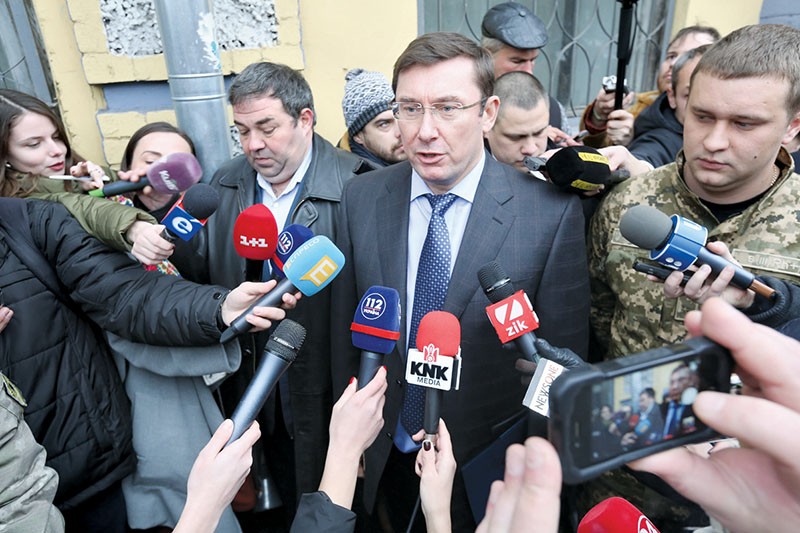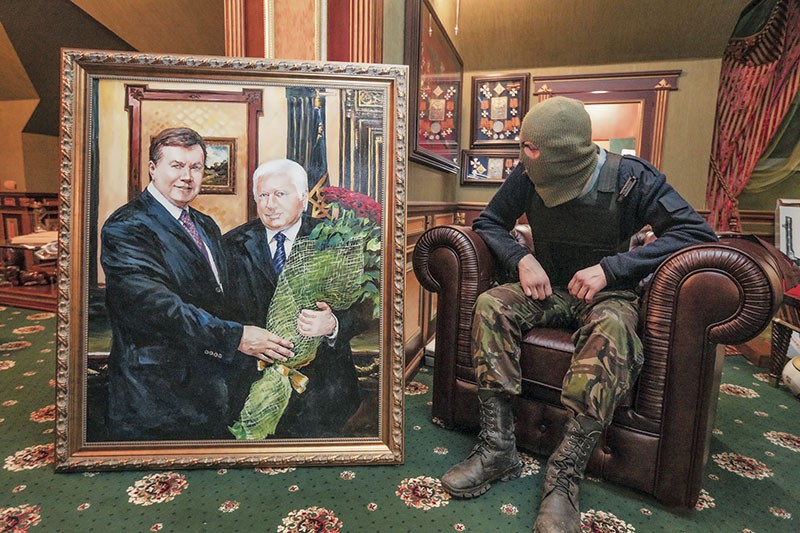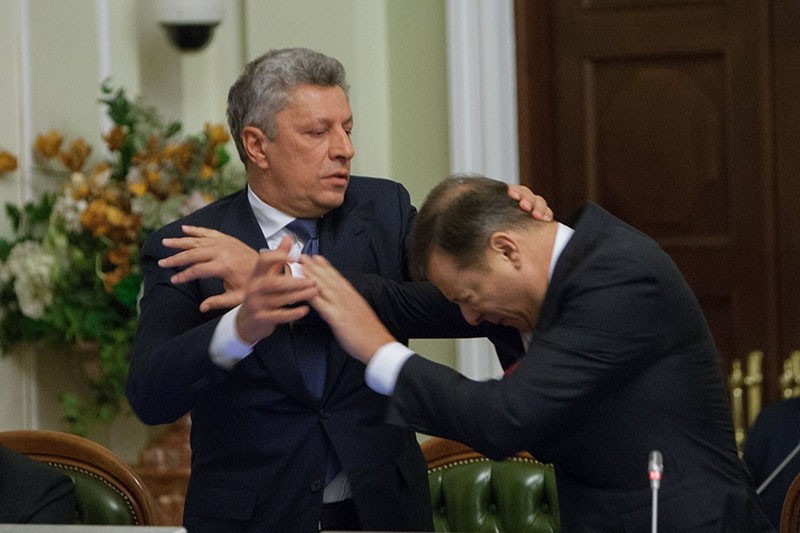Editor’s Note: This op-ed was originally published by EuroMaidan Press and is being reprinted with the author’s permission.
A bit over a year ago in Ukraine, President Petro Poroshenko appointed Yuriy Lutsenko as prosecutor general.
The thing Lutsenko has done best during the subsequent year was to generate good public relations for his activities, experts say.
In the pursuit of impressive headlines (like the recent helicopter-assisted raid against tax officials conducted precisely at the time Lutsenko was reading his report to parliament), substance has been tossed out the window.
Apointed after the dismissal of the scandalous Viktor Shokin on March 29, 2016, Lutsenko, Poroshenko’s man, had the parliament vote to change the law specifically to make it possible for someone without a legal education to be prosecutor general.
He promised to do what other prosecutor generals had failed to do — to investigate who is guilty of killing EuroMaidan Revolution protesters; to bring ousted President Viktor Yanukovych and his accomplices to account and to return the assets they stole; and to reform the Prosecutor General’s Office, renewing trust in it and appointing truly independent prosecutors.
Let’s see what he achieved.

Prosecutor General Yuriy Lutsenko speaks to journalists after reading a notice of suspicion for ex-President Viktor Yanukovych in a treason case on Nov. 28, 2016. (Volodymyr Petrov)
‘Trial of century’
As Yanukovych fled to Russia following the Euromaidan Revolution on Feb. 22, 2014, Lutsenko chose to speed up proceedings in absentia.
However, his subordinate Serhiy Horbatiuk, who heads the Office of Special Investigations, which dealt with Yanukovych’s crimes, doesn’t agree with the haste with which Lutsenko started the “Trial of the Century.”
According to him, Ukraine’s current law on trials in absentia goes against the Ukrainian Constitution and European conventions, as a result of which it’s even possible that Yanukovych will sue Ukraine in the European Court of Human Rights. In response to Horbatiuk’s skepticism, Lutsenko reformed the Special Investigations Department, transferring the investigation of the economic crimes of Yanukovych to a more loyal subordinate.
Meanwhile, Anatoliy Matios, head of the military prosecution, took on Yanukovych’s case, suggesting that Ukraine make use of Yanukovych’s “invasion letter,” shown by Russia’s representative to the United Nations on March 3, 2014, in which Ukraine’s fugitive ex-president asked Russia to deploy troops to Ukraine, to prove Yanukovych had committed treason. But critics say this approach is far from being leakproof — to commit an act of treason, Yanukovych would need to be in a position of authority; however, at the time, Yanukovych was had been stripped of presidency by a parliamentary decision.
So, despite Lutsenko’s grand accusations of treason at the start of the trial, which received great publicity, the case actually looks quite shaky.
$40 billion stolen
Recently, Ukrainian Justice Minister Pavlo Petrenko announced that, during the four years of Yanukovych’s reign, the ousted leader and his associates stole $40 billion from Ukraine — a number equal to the annual state budget.
Of this $40 billion, $1.1 billion was arrested in Ukraine. The rest is now under different jurisdictions in different states, spirited away through complex schemes. Ukraine has not yet adopted a special confiscation mechanism that would enable there to be the kind of international cooperation that would make it possible to return these funds.
Lutsenko proclaimed that prosecuting people who enriched themselves at the expense of ordinary Ukrainians was of prime importance.
A year later, nothing has happened.
Vitaliy Shabunin, head of the Anti-Corruption Action Center, claims that the “trial in absentia” novelty made it possible to open proceedings against them. Despite this, the corruption crimes of Yanukovych, his son Oleksandr Yanukovych, ex-Minister of the Interior Vitaliy Zakharchenko, ex-Prosecutor General Viktor Pshonka and his son, ex-Minister of Justice Olena Lukash, Yanukovych associates Andriy and Serhiy Klyuiev, ex-National Bank Head Serhiy Arbuzov and many others have not been proven (although a petition on the conviction of Azarov in absentia was submitted to the Pechersk court days ago).
“Nothing is confiscated, the cases are falling apart before our eyes.(…) These people are still under the sanctions of the European Union and other countries. Each day of delay of the criminal cases against the figures on the sanction list gives more reasons for international institutions to consider these cases to be politically motivated and reduces the value of the evidence already found,” Shabunin says.

A protester rests in an armchair in the mansion of former Prosecutor General Viktor Pshonka on Feb. 24, 2014, next to his portrait with ex-President Viktor Yanukovych. Just as Pshonka was loyal to Yanukovych, current Prosecutor General Yuriy Lutsenko is seen by his critics as faithful to Ukrainian President Petro Poroshenko as the nation’s law enforcers continue to fail to stop corruption and bring justice. (Kostyantyn Chernichkin)
No longer wanted
Proving Shabunin’s point, Interpol announced it was taking Yanukovych and his son off its wanted list.
Many of the 27 Ukrainian officials that were in Interpol’s database in August 2014, suspected of embezzlement of public funds and property, are no longer wanted abroad.
It is important to prove to Interpol that the suspect is implicated in criminal activity and is not merely facing political persecution.
Yanukovych’s defense is to argue that Ukraine’s case against him is purely political — and in the absence of a proper investigation, this tactic seems to be working.
Prosecutors stated that Interpol’s decision was caused by flaws in the Ukrainian legal framework on applying preventive measures to wanted persons. But over the last year, prosecutors have not raised the issue of amending Ukraine’s legislation to bring it into accordance with the demands of Interpol. Lutsenko shrugged off the incident, suggesting that Ukraine would submit a repeat application to Interpol after the final verdict of the court in Yanukovych’s case.
Underlining the lack of action against criminals of the old regime within Ukraine, the Ukrainian parliament on May 18 remarkably failed to approve sanctions against Yanukovych allies.
Yuriy Boiko scandal
Another cause for indignation inside Ukraine were Lutsenko’s actions to cover up a major corruption scandal involving Yuriy Boiko, currently the leader of the Opposition Bloc (the successor to Yanukovych’s Party of Regions).
Boiko is suspected of stealing $180 million from the Ukrainian budget through the purchase of drilling rigs in the Black Sea in 2011 and participating in the criminal schemes of Serhiy Kurchenko, a fugitive oligarch evading prosecution in Russia.
Now there is a petition calling for a vote of no confidence in Lutsenko in the Ukrainian parliament, which currently has 44 signatures out of the necessary 150.

Opposition Bloc lawmaker Yuriy Boiko (L) fights with Radical Party leader Oleg Lyashko on Nov. 14. Boiko has escaped justice on allegations of steaing $180 million from the state, charges he denies. (UNIAN)
Transparency International, Ukraine’s leading international anticorruption NGO, is unimpressed by Lutsenko’s efforts. In its statement on May 24, it claims that Ukraine is losing the last opportunity to demonstrate to the world the effectiveness of its anti-corruption program.
“There is no case in a court against Yanukovych, who is the most famous corrupt official in the world, according to a poll conducted by Unmask the Corrupt, which directly deals with corruption offenses. The total amount of stolen money is still unknown, but the sum ranges from approximately $7.5 billion up to $40 billion. It seems that officials and the authorities are not performing well and depend on society. Another year has passed, but there has been no action to set up an anti-corruption court. Such a court is the only opportunity to break the cycle of impunity,” said Jose Ugaz, the chair of Transparency International.
Lutsenko reacted angrily to Ugaz’s statement, accusing the anti-corruption organization of “defaming the entire country.”
Neither does Transparency International have much faith in Lutsenko’s efforts to return Ukrainian assets stolen by Yanukovych and his allies. In an interview with the Kyiv Post, Ugaz said they are considering filing civil cases concerning the $40 bilion that Yanukovych and his accomplices stole from the Ukrainian people.
This comes after Ukraine’s National Security and Defense Council on April 28 announced the sensational news that a court had allowed the transfer to the state budget of $1.5 billion of the money Yanukovych and his cronies had stolen.
Widely hailed as a victory, the move raised questions among anti-corruption activists.
Secret court order
Lawmaker and journalist Serhiy Leshchenko contends, without citing his sources, that the court, which turned out to be located in the remote city of Kramatorsk, has confiscated the money from another criminal proceeding in the case of Arbuzov, through a case against a certain Arkadiy Kashyn, which was started two years ago. The decision of the Kramatorsk court has not yet been made publicly available.
Leshchenko notes that in September Lutsenko said that it was previously impossible to return that $1.5 billion, because it was impossible to establish the owner of the offshore companies that were acting as nominal holders of the securities. Cyprus still hasn’t provided that information.
This makes Daria Kaleniuk from the Anti-Corruption Action Center fear that the absence of the decision of the Kramatorsk court in the public domain will mean that Ukrainians might need to pay this sum back:
“Lutsenko announced that this confiscation of a mythical $1.5 billion that was in securities of offshore companies and which was supposedly connected to Yanukovych, is a victory for the prosecutor’s office, and for him personally. But in violation of all legal norms and standards, he somehow managed to hide this court decision from public scrutiny. We would like to professionally assess this document and understand whether (and when, if it is so) we will need to return this confiscated $1.5 bilion to the Yanukovyches? If the confiscation procedure is violated, returning it is only a matter of time.”
Lutsenko’s PR platform
Confirming Kaleniuk’s fears, on May 12–17, seven offshore Cyprus companies appealed against the Kramatorsk court decision, according to their lawyer.
Kaleniuk says that this case is emblematic of the work of Lutsenko as prosecutor general: the Prosecutor’s Office has become his PR platform and a springboard for his political career.
Lutsenko’s empty words about returning stolen assets to the government were also recently pointed to by the nongovernmental financial transparency organization “Nashi Hroshi.”
The NGO embarked on a mission to fact check Lutesnko’s impressive statement about returning Hr 10 billion ($380 million) of corrupt money to the state budget in 2016, though analyzing 51 volumes of court decisions that prosecutors provided in response to an official request from a member of parliament.
It turned out that, of the declared Hr 10 billion, only 12.6 percent — Hr 1.26 bilion — could be verified by court decisions.
While Lutsenko had not sabotaged the investigation, he had not taken any actions to assist it. His lack of interest in progress in this field is demonstrated by populist statements in which he urges investigators to submit the cases to court more quickly, thus increasing the danger that the hastily put together cases will fall apart during hearings.
As mentioned above, after the conflict with Horbatiuk, Lutsenko split up the Special Investigations Department, stripping it of graft cases against Yanukovych and his entourage. This has not helped to establish justice, according to Pavlo Dykan, a lawyer of the relatives of slain EuroMaidan protesters. Coordination, as well as the effectiveness of the investigation, has suffered. Neither did prosecutors initiate the harmonization of Ukraine’s laws with international humanitarian law, like the ratification of the Rome statute, and resolve the legal implications of holding trials in absentia.
No reform
However disappointing the previous assessments may be, they are dwarfed by the troubling transformations inside the Prosecutor General’s Office itself over the last year.
Lutsenko was appointed to head a corrupt system which made the crimes of Yanukovych and company possible in the first place, which was, following a short-lived rebellion of new faces against the system, crushed by the old regime.
The reform of the local prosecutors announced under Shokin was essentially destroyed: virtually all of the people heading the newly created local prosecutor’s offices are representatives of the old system.
Without honest prosecutors, there can be no justice.
It is the Prosecutor General’s Office that can put an end to large-scale organized crime. And “restoring confidence” in prosecutors through lustration was one of Lutsenko’s stated goals. One year later, there is little to celebrate, according to Oleksandr Banchuk from the Center of Political and Legal Reforms, and Tetyana Pechonchyk, Head of the Human Rights Information center.
Banchuk and Pechonchyk state that democracy in the Prosecutor General’s Office was tossed out the window in the formation of the very organs which were supposed to ensure it — the Qualification Disciplinary Commission and the Council of Prosecutors, which were formed as prosecutorial organs of self-governance that would decentralize the appointment, promotion, and dismissal of prosecutors.
Sadly, this didn’t happen.
The candidates that the All-Ukrainian Conference of Prosecutors appointed to the self-governance organs in 2016 were dismissed and others were chosen in a hastily held conference on April 27, with the participation of military prosecutors, apparently loyal to Lutsenko, who have a totally different system of governance and are in no way related to the functioning of the prosecutors.
Although it has been argued that the 2016 conference elected loyalists of the previous compromised Prosecutor General Viktor Shokin, the 2017 conference ostensibly elected loyalists of Lutsenko, which begs the question: how is he any different to his predecessor?
Neither does Lutsenko make publicly available, as the law prescribes, his orders on appointments, dismissals, orders and financial spending, making public scrutiny over law and order inside the institution impossible.
Power grab
The Prosecutor General’s Office, instead, seeks more power, contrary to the Constitution.
Amendments adopted to Ukraine’s Constitution on June 2 convert the Prosecutor General’s Office from a separate oversight structure into an organ of the system of justice. But to this day, the institution has not only failed to adopt a plan on how to limit its functions, it has lobbied for a law that extends them, contradicting the constitutional amendments (it was not adopted), Banchuk and Pechonchyk say.
Additionally, they state, the institution seeks to extend its control by lobbying for a law to create a subsidiary university, which would be at odds with academic freedom and create endless corruption opportunities.



